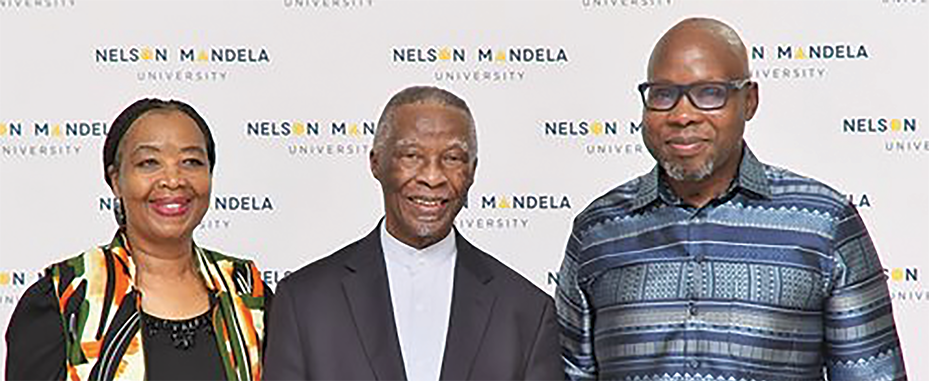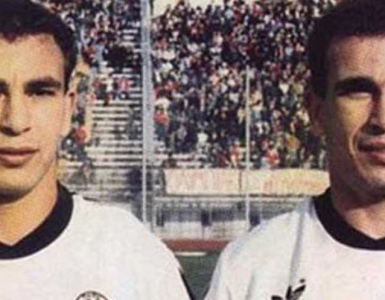CRISIS: This was the moment in South Africa for ‘people-led change, for action, for a new future’, the former President tells leading educationists…
By Own Correspondent
Former President Thabo Mbeki has called upon the intelligentsia and thought leaders in higher education to come up with the actions required to address the crises facing every sector of South African society.
Speaking at the Eastern Cape Higher Education Sector National Dialogue Launch, hosted by Nelson Mandela University in Gqeberha on November 1, Mbeki said: “The economy is in crisis, politics is in crisis, the crime, the corruption … there is nothing in South Africa 30 years into democracy that does not say crisis.” He emphasised the importance of this launch in terms of the National Dialogue and added that the country now needs “action, not wish lists” to address the crises.
Leaders from all four universities and eight TVET colleges in the Eastern Cape attended the dialogue, as well as a range of participants in education, government, labour, business, the media and citizens, both in person and online.
Nelson Mandela University’s vice-chancellor, Professor Sibongile Muthwa, opened the dialogue and said the University felt compelled to host it, given the state of the nation, the name the university carries and the centrality of education to the future of the country.
It is through educational excellence that the country produces the intelligentsia and thought leaders. The role of education is to nurture innovative, qualified, good, ethical, honest people who can contribute to the economy, to leadership and to the betterment of our society.
Several speakers at the dialogue expressed that change without relevant, quality education and human development is not sustainable. Yet, the government was not prioritising education as it should. Subsidies were declining, and the general state of basic education and certain sectors of higher education reflect the urgent need for transformation.
Mbeki said the intelligentsia and thought leaders across all sectors in society have to step up and play a leading role in the National Dialogue to address the country’s crises. “The politicians are not thought leaders, I don’t know what they lead, but they are not thought leaders,” he said.
Mbeki called upon higher education to provide tangible, practical solutions to tackle the educational crisis, but to go far beyond this, and come forward with action plans as to how to grow the economy, create jobs, reduce poverty, address crime, stop violence.
He said higher education institutions need to be able to advise the 32 different constituencies in the National Dialogue, be they women or civil society organisations, business, labour, traditional leaders or religious bodies.
He explained the National Development Plan, adopted by Cabinet in 2012, was supposed to address all the issues the country faces, and offer a road map of how the country would develop by 2030.
“It is very comprehensive and detailed in terms of the various topics but it is not a plan, it is a vision,” he said. “The vision was never translated into practical steps – Step 1 on Monday we do this.”
He said the intelligentsia should have intervened to transform the vision into a plan of action.
“With the National Dialogue, this is what you now need to contribute,” he told the audience.
At a national level, he said one of the actions South Africa needs to consider is the manner in which the President of the country is elected. Chapter Five of the South African Constitution sets out the role of the President very clearly. This significant responsibility includes accountability, a commitment to fighting corruption and upholding, defending and respecting the Constitution.
Currently, Mbeki said, the biggest party proposes a candidate for President and the person is voted in, “but is that person capable of carrying out all the duties required of the President?” He added that when parliament said he must become president, they did not know what he was capable of and never asked. It was imperative that the President of the country was qualified for the task.
In every sector, he continued, there is a vision but no action. He offered the example of tourism in the Eastern Cape, where there is constant discussion about increasing tourism, developing the economy and creating jobs. He said this is a province with a phenomenal intellectual and historical legacy that should be leveraged.
He recalled how, at some stage, he had asked one of the members of the executive committee of the Eastern Cape whether he had read ‘Frontiers’ by Noël Mostert, a seminal work on the wars fought between the Xhosa nation and the white settlers in 18th and 19th century Eastern Cape.
“He hadn’t heard of it and so I gave him a copy,” said Mbeki, explaining that the book provided a perfect tourist route through the Eastern Cape, showing off the beautiful province while illuminating how all the places came into being, such as Port Elizabeth/Gqeberha, Grahamstown/Makhanda, and Fort Hare. Mbeki said a well-run tourist offering of this nature would attract tourists from Germany, the UK and other parts of the world, creating jobs and opportunities across the province, as one example.
In the health sector, he said South Africa needs to bring together the health profession’s intelligentsia to discuss the National Health Insurance (NHI), put all the problems on the table and the actions that have to be taken for it to be possible.
He emphasised that in all sectors of society this is the moment for people-led change, for action for a new future. It is a moment in history that all the people of South Africa have to make count. A moment that we can look back on and say it feels good to be South African. – Courtesy of Nelson Mandela University
Comment
OVERHAUL THE POLICE FORCE
Drug abuse, poverty and gang violence seem to have reached alarming proportions in most parts of the country amid reports that these problems – if not urgently attended to by the police – could pose a bigger threat to South Africa’s future than the AIDS pandemic that claimed thousands of lives.
The recent killing of about ten people, including teenagers in Westbury, Johannesburg and Reiger Park in Boksburg, in alleged drug-related attacks is a stark message that the country was on a powder keg ready to explode unless the drug problem is urgently resolved.
Two teenagers were shot dead and five others injured in Westbury while in Reiger Park, six people lost their lives after being killed in a drive-by shooting. Six others were injured. Five suspects have since been arrested in both incidents. Police have been blamed for always being reactive to drug-related violent incidents which affected the safety of citizens. Despite regular complaints by community leaders about gang violence and drug-related incidents in their areas, police have been accused of turning a blind eye to these complaints.
This is not surprising though. Most South Africans have been glued to television sets in the past weeks listening to shocking allegations of corruption involving high-ranking police officers while the country was under siege from criminal syndicates including drug dealers. Instead of mobilizing and formulating strategies to combat these serious crimes, some of the country’s top officials have allegedly been busy soliciting bribes and colluding with criminal syndicates to line their pockets.
We need to remind those corrupt police officers that South Africa was facing a significant and escalating drug problem with consumption rates estimated to be twice the world norm, according to the World Health Organisation . Drug abuse was also costing South Africa R20 billion annually while South Africans were spending R3,5 billion a year on dagga alone. This is shocking.
The recently released UN World Drug Report also named South Africa as one of the drug capitals of the world. Youth were particularly vulnerable with studies showing that many children experimented with drugs before the age of 12. Many of them turned into addicts and resorted to theft to finance their habits.
The spate of drug-related killings however, can only be resolved by committed police officers who have vowed to serve their communities with pride. The evidence that has so far emerged from the two current commissions of inquiry, have revealed that the war against crime would never be won as long as we have corrupt police officers at the helm.
The cancer of corruption has now heavily entrenched itself in the top structures of the police force. What remains to be done is a total overhaul of the structure and help rescue this ailing and sinking ship.
Failure to do so would result in the total collapse of law and order in this country where criminal elements would operate with impunity.






























